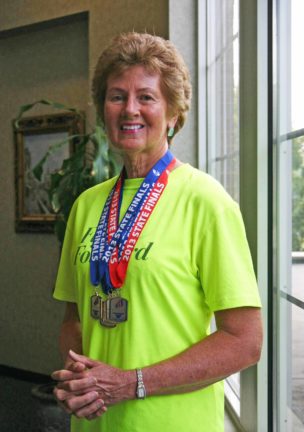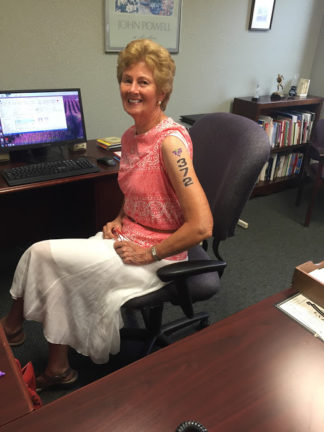Janet Jernigan has won countless awards in her life. Her more than 50-year career as a nonprofit leader is legendary as are the records she currently holds as an athlete. However, her true advocacy for others may be rooted in the mid-1960s when, as a student at Vanderbilt University, she began to advocate for equality by playing a role in the civil rights movement in Nashville. Her tenacity as a nonprofit leader, an advocate for others — including women — and as a runner and a triathlete are legendary. Learn how this remarkable woman finds time to care for herself and others in this Squeeze the Day.
Q. You’re a tireless advocate for others. Is your nonprofit leadership grounded in your advocacy for civil rights in the 1960s?
Well, I think mainly a lot of my leadership experiences really started through the United Methodist church. I was an officer in the district United Methodist and the Tennessee Conference United Methodist. I was chair of Christian Social Concerns. And, at the time we were mainly concerned about alcohol and sex, and I was for one and against the other, but I decided that we really needed to focus more on a real social issue at that time. That was segregation. So, when we were officers, several of us who were still in the community and were active in the Methodist church, became more involved in the civil rights movement. My father also was involved in The Minister’s March. So, I just kind of grew up headed toward that direction.
Q. Competing, goal setting, and being an athlete are significant priorities for you. Tell us a little bit about that and the Senior Olympics.
 You’re eligible to start in the Senior Olympics when you get to be 50 years old. And I really didn’t hear about it until I think I was 52. I’ve been involved and active for 25 years or so now. And the most wonderful thing about it is you meet all sorts of people. One of the very first experiences was with a 100-year-old woman who actually celebrated her 100th birthday on the track. That was just really inspirational to me. So, I’ve been involved in [Tennessee] Senior Olympics, both at the district, the state and the national level. Now, I pretty much help them some with their fundraising and hope to support other athletes as they come along.
You’re eligible to start in the Senior Olympics when you get to be 50 years old. And I really didn’t hear about it until I think I was 52. I’ve been involved and active for 25 years or so now. And the most wonderful thing about it is you meet all sorts of people. One of the very first experiences was with a 100-year-old woman who actually celebrated her 100th birthday on the track. That was just really inspirational to me. So, I’ve been involved in [Tennessee] Senior Olympics, both at the district, the state and the national level. Now, I pretty much help them some with their fundraising and hope to support other athletes as they come along.
Q. You have a friendly rivalry with Marge Stoll, please elaborate on the barriers you two are breaking together and independent of one another.
Well, I met Margie probably between 15 and 20 years ago and we were in a track event. I didn’t know her. She’s actually three years older than I am. But the way the age groups go — every five years — for two [of those] years we have to compete [as runners] against each other. The very first time we were on the track [together], I was flying along and there was this woman just right on my heels. I just barely crossed the line before she did. I turned around and introduced myself and asked her how long she’d been running. She said, “six months.” I said, six months? … I’d been running almost 30 years at the time. I said, you are really, really talented. So, I guess that inspired her. She hired a coach. And that was about the last time I ever came in ahead of Margie until I guess recently … she started to slow down on the longer events, like the half marathons. (In the interview, the very competitive Janet continued to share her desire to ambitiously go after Stoll’s record.)
 Q. Tell us about your experience as a triathlete.
Q. Tell us about your experience as a triathlete.
Well, I got into the triathlons when I turned 40, because I thought 40 was a big crisis … kind of pinpoint birthday. Little did I know how young 40 is now. That’s how I got into triathlons. And I had my good friend, Susan, whom I actually started running with. She and I did triathlons together. And primarily we do the sprint distance ones, which are usually 5k, a 3.1 mile run, then usually about 26 miles on the bike, and quarter or half mile swim.
Q. What is your greatest advice for women today in the workplace?
I think the main thing is you need to have other people as resources — whatever it is you might need to know or experiences that you don’t have — to find somebody who knows more about it than you do. The role of mentors is really important.
Jernigan continues to discuss the role relationships, government affairs, and community connections have played in her life. In addition, she shares poignant stories about her husband including how they first met, the role horses played in their lives, and his innovative proposal for marriage. She underscores how a sense of humor continues to be an important tool in their journey together.
Learn how this retired nonprofit leader continues to give back to the community and how her advocacy for others continues into her personal life now as a caregiver for her husband. Don’t miss these compelling and history-filled stories including Janet Jernigan’s tips for self-care and remaining positive against all odds.

 This Squeeze the Day is brought to you by the All of Us Research Program from the National Institutes of Health. Learn how you can help change the future of health by participating in the program.
This Squeeze the Day is brought to you by the All of Us Research Program from the National Institutes of Health. Learn how you can help change the future of health by participating in the program. 
